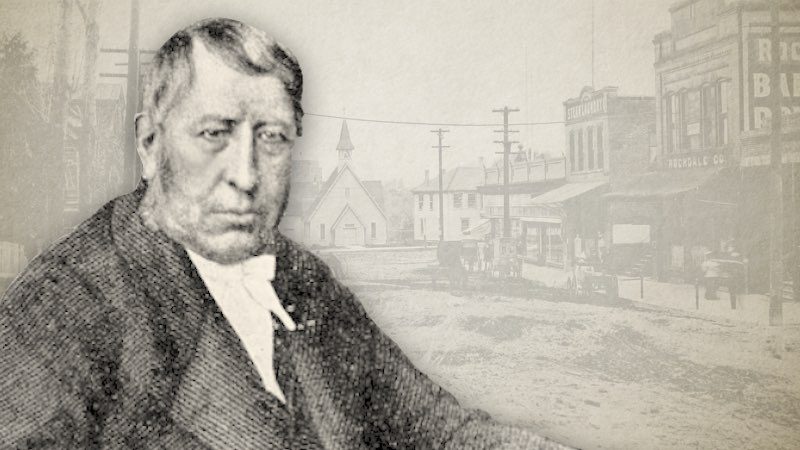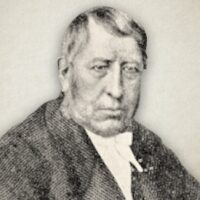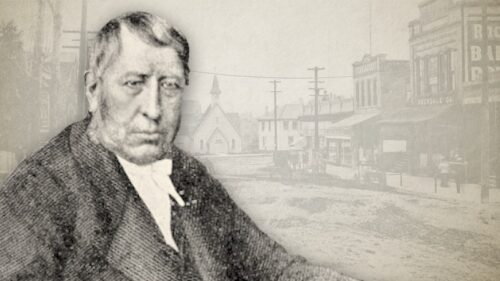
Salvation By Grace
Substance Of A Sermon Preached By John Kershaw At Zoar Chapel, Great Alie Street, London, On Lord’s Day Morning, April 12th, 1846.
“For by grace are ye saved, through faith; and that not of yourselves; it is the gift of God. Not of works, lest any man should boast.”—Ephesians 2:8,9
My beloved friends, as we had this precious portion of God’s holy Word under consideration last Lord’s day, we will come at once to the second part of our subject, that the enjoyment of our interest in the salvation of Christ is by faith.
What a blessing, beloved, for us that the work of salvation is finished. The poor sinner is made to feel his lost, ruined and undone state. It is necessary in this part of our subject to draw a line of distinction between the real, genuine faith of a be- liever and the faith that a man may have and yet not be quickened by God the Holy Spirit. Now, there is what is called a nominal, natural faith. James, speaking on this subject, says, “Thou believest that there is one God. Thou doest well!” Better be so than to be an infidel, to deny the Supreme Being. But recollect, the devils believe this, and they tremble. The devils believe that Jesus is the Saviour of his people, for the devils cried out, “Art thou come to torment us before the time?” And in another place, “Jesus I know, and Paul I know; but who are ye?” So you see there is a faith that both men and devils may have, and yet be destitute of living faith.
The Lord, speaking in the parable of the sower, said there were some who for a while believed, but in time of temptation fell away. Paul had to do with a great many of this sort, who for a time believed, but in the time of temptation and trial they left him. So, you see, there is a faith that we have a command over as regards assenting and consenting to the word of truth; but the real faith of God’s elect we can no more command than we can command our souls to leave our bodies. Now, my friends, it becomes you and me to have a godly jealousy to know whether we are in the faith for, as it respects genuine faith, it is the gift of God the Holy Spirit; it is a limb of the new creature. Paul says, “For we are not of those that draw back unto perdition, but of those that believe to the saving of the soul.”
It is called the faith of God’s elect; and why is it called the faith of God’s elect? Because it is wrought in the children of God and none else. You see this proved. “Now faith cometh by hearing, and hearing by the Word of God.” The apostles preached the Word, and the Lord gave it success; and then it is written, “As many as were ordained to eternal life believed.”
“By grace are ye saved, and that not of yourselves; it is the gift of God.” The faith of the elect is a plant that never grew in nature’s garden. He who has this faith believes all that God says in his holy Word, not only because it is in the Word of God, but because he feels and knows these things in his heart. What is it without the feeling? It is, as John Berridge says, not worth a groat. The child of God does not want to go to those great commentators, such as Dr. Gill, Dr. Hawker, Matthew Henry, and other great men, from which many of our parsons get their sermons. No; he has it in his heart. I must stick to feeling. Some parsons say, “Bother your feelings!” Well, I cannot think so. If I had been out and come home very hungry, and saw a good table spread, and plenty of good things talked about, that would not satisfy my hunger. I must eat the things myself to be satisfied.
Christ is the Author of our faith; and not only is he the Author, but he carries on the work of grace in our hearts. Some professors talk about their faith, that they can believe when they like. I know I cannot. The child of God knows by daily experience that he feels dark and shut up, and cannot lay hold on a single promise. It just comes to my mind about a gracious woman that came seven miles to join our church. She said that she was tossed to and fro in her mind for a long time to know whether she was one of the elect. She could not see how it could be; till one morning, when she awoke, these words came to her with power: “The new and living way! The new and living way!” “O,” she said, “I saw that Jesus was the way,” and from that she got comfort; and often from such texts as these does the Lord give us comfort. “I am the way, the truth, and the life. No man cometh to the Father but by me.”
Now may the Lord assist me to show to some poor, cast-down sinners that they have faith; and O that he may be with us. You do really and truly in your hearts confess before God that you feel guilty, lost, ruined and undone. Well, poor souls, there must be life to feel your deadness; there must be light to see your darkness. The great object of your faith is the Lord Jesus Christ; you love him. I know a man who said he could never think he was a believer, he never thought he had faith, until one night, he said, “Our parson preached from these words: ‘Unto you that believe he is precious’; and as he was speaking, I did feel him precious to my soul, and I said, ‘I have faith.”‘ There is a verse of a hymn on the subject on which we are now dwelling; it is addressed as a prayer to the Holy Ghost:
“Assure my conscience of her part,
In the Redeemer’s blood;
And bear thy witness with my heart,
That I am born of God.”
This is what the child of God wants to know, whether he is interested in the love of Jesus. You know that Jesus is the Saviour of his people, and that none of them will ever be lost. You have no doubts about that; but this is not enough for you, you want to feel that he is yours. It is as Hart says,
“True religion’s more than notion;
Something must be known and felt.”
“And that not of yourselves.” Now we must go to the fountain head. God saw all the elect from everlasting. So far will the Arminians go with us. Let them have it their way. They say “that God saw all those that would accept his grace, and be good; so he loved them.” Why, if so, it would contradict our text: “Not of works, lest any man should boast.” “Where is boasting, then? It is excluded. By what law? of works? Nay; but by the law of faith.” It would contradict the truth of God. I should have room to boast if, as they say, God loved me because he foresaw I should be a good man. He loved us because he would love, and for no other reason; for so far from the creature loving, he is at enmity with God and strives against him. So “it is not of him that willeth, nor of him that runneth, but of God that showeth mercy.” And again: “And the children being not yet born, neither having done good or evil, that the purpose of God according to election might stand, not of works, but of him that calleth; it was said unto her, The elder shall serve the younger; as it is written, Jacob have I loved, but Esau have I hated.”
If I were like what some professors talk about, I would not go groping all the day long, and be obliged to cry, and sigh, and groan for a few crumbs; all darkness, and not able to lay hold on a single promise. “Truth, Lord, yet the dogs eat of the crumbs that fall from the Master’s table.”
“Not of works, lest any man should boast.” Where were you and I, beloved, when the Lord first called us? I look back and remember as fresh as if it were but yesterday, 200 miles from here. I was at enmity with God. I used to go roaming about on the Lord’s day, instead of going to chapel. I used to hate my father’s religion. I did not hate him as my father; but when I came home at night I could not rest. I was uneasy in my conscience. I felt the wrath of God against me, and when I look back and see my old companions in iniquity, for I sometimes do (for it hath pleased God to keep me in the same place), this text will often start up in my mind: “Who maketh thee to differ from another?” There was one of my companions who was more steady than I, for I used to drag and urge him on; but the Lord in his mercy has been pleased to take me and leave him. Where is boasting, then?
There was another of my old companions that got on well and became a manufacturer, and the devil used to tease me very much about him, and told me that if I had gone on as he had, I should have got on well in the world. But after I had been with you six weeks, when I got home, my wife said to me, “Do you know Abel is broke all to pieces, and can only pay three shillings in the pound?” “Well,” said I, “I’m a better man. I’m a better man. I can pay twenty shillings to the pound, and a pound left.” But after a time, some of my friends said to me, “Do you know Abel has attempted to hang himself?” “Where is boasting, then? It is excluded.”
Paul said, “God forbid that I should glory, save in the cross of our Lord Jesus Christ”; and unto him alone must we give all the glory. “Not unto us, O Lord, not unto us, but unto thy name give glory, for thy mercy and for thy truth’s sake.”
John Kershaw (1792-1870) was a Strict and Particular Baptist preacher. He was appointed the Pastor of Hope Chapel, Rochdale, serving this position for fifty-three years. John Hazelton wrote of him:
“His autobiography is one of the best books of its kind and one striking incident we will quote. It is his account of his interview in Edinburgh with Dr. John Duncan, often called "Rabbi" Duncan, because of his profound knowledge of Hebrew. Dr. Duncan (1796-1870) was Professor of Hebrew in New College, Edinburgh, and was a man of the most acute and profound intellectual powers, and at the same time a deeply spiritual and Scriptural preacher. In learning and associations he was at the antipodes of plain John Kershaw. In November, 1861, Mr. Kershaw preached in Edinburgh, arrangements having been made through Lady Lucy Smith, who was desirous that his original and powerful ministry should be exercised there. He writes:—"Another of my visitors was Dr. Duncan, who I was told by one of the ministers understood fourteen languages and that there was only one in the City who surpassed him in learning. He told me he had heard me preach three sermons, and he quite agreed with me in every statement that I had made, both in doctrine, experience and practice, save one, and that I had not fully entered upon, namely, 'the extent of the call of the gospel.' He candidly told me that his human learning had for years past been a great hindrance to his coming to a saving knowledge of the truth, and he had proved Paul's words, that the world by wisdom knew not God; and referring me to 1 Cor. 1:21,22 said he was for a long time like a wandering star or a ship at sea without a compass, ready to settle in every 'ism'—sometimes Arianism or Socinianism; and sometimes his mind was bordering upon infidelity. He declared himself much ashamed of many of his theological productions. When it pleased the Lord to work in his soul by the power of the Spirit he was for a long time in a distressed state, not knowing what to do to get peace and comfort. A conversation with another minister was made useful to him and he was enabled to go to the feet of Jesus as a little child and beg Him to teach him, a poor ignorant sinner, by His Spirit and His Word. The Lord graciously heard prayer and revealed Himself as his Saviour and Redeemer. We spoke of Scott's 'Force of Truth,' in which the author confessed he had been priding himself on his human attainments, opposing the doctrines of grace, and despising his neighbour, that dear man of God, John Newton, who eventually was made a blessing to him; also of John Berridge, who preached some years before the Lord stripped him and caused him to flee to Jesus for refuge. The conversation I had with this man I hope never to forget."
John Kershaw Sermons




